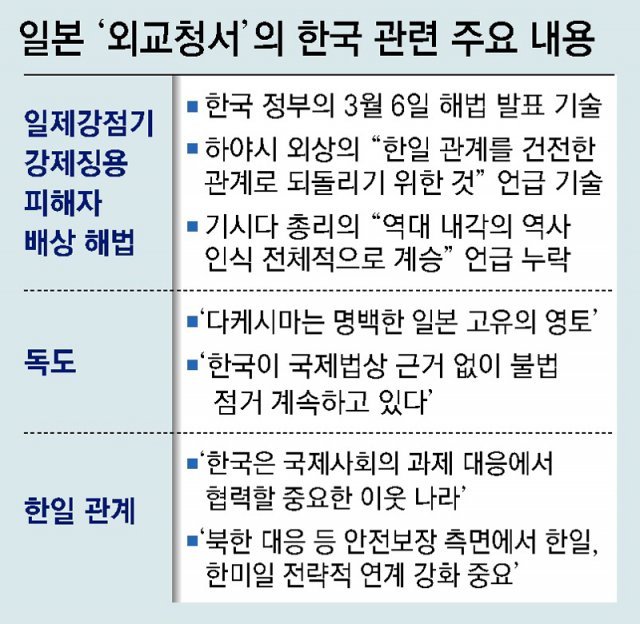No mention of Kishida related to the draft resolution
The expression “Korea is an important neighbor to cooperate with” is progress
“South Korea’s Illegal Occupation of Dokdo” Continued for Six Years
Ministry of Foreign Affairs Calls Deputy Ambassador to Japan to Protest
In the 2023 edition of the “Diplomatic Blue Book” (Korea’s diplomatic white paper) released by Japan on the 11th, the “history of past cabinets” mentioned by Japanese Prime Minister Fumio Kishida while describing the solution to compensation for victims of forced labor during the Japanese occupation of Korea last month Awareness succession’ statement was not included.
The South Korean government interpreted Prime Minister Kishida’s comment as a successor to Japan’s ‘reflection and apology’ contained in the 1998 ‘Kim Dae-jung-Obuchi Joint Declaration’. However, it is pointed out that Japan’s passiveness in reflecting on its past history has been revealed once again as Japan does not include this in its documents.
Japan also continued its unreasonable territorial claim to Dokdo, stating that “Korea is illegally occupying Dokdo.” The expression ‘illegal occupation’ has been maintained for six years after being reflected in the diplomatic blue book in 2018.
The Ministry of Foreign Affairs issued a comment in the name of a spokesperson and said, “We strongly protest and urge an immediate withdrawal.” Naoki Kumagai (熊谷直樹), acting ambassador (overseeing minister) of the Japanese Embassy in Korea, was also summoned to protest against the unfair claim of sovereignty.
Foreign Minister Hayashi Yoshimasa reported the ‘2023 Diplomatic Blue Book’ at a cabinet meeting (the equivalent of a cabinet meeting) that day. Every year in April, Japan publishes a diplomatic blue book, which records the latest international situation and its diplomatic activities. Diplomatic activities in 2022 are the standard, but some important diplomatic activities that took place this year, such as South Korea’s announcement of a solution to forced labor on the 6th of last month and Prime Minister Kishida’s visit to Ukraine, are also included.
Regarding Korea’s conscription solution, Japan said in this Blue Paper that foreign minister Hayashi “evaluates that Korea-Japan relations, which were in a very serious state due to the Supreme Court ruling in 2018, were to be returned to a healthy relationship, and exchanges between Korea and Japan are expected to expand.” Including the parts mentioned.
However, the part about reflecting on the past was omitted. At the time, Foreign Minister Hayashi said, “I confirm that Japan has inherited the position of the previous cabinets on historical awareness as a whole, including the 1998 Kim Dae-jung-Obuchi Declaration.” Prime Minister Kishida also said, “With regard to historical awareness, the position of the previous cabinets as a whole has been inherited and will continue,” but did not include it.
Japan continued to make unreasonable claims about Dokdo. Japan said, “Takeshima (the name Japan calls Dokdo) is Japan’s inherent territory, which is clear both in terms of historical facts and in terms of international law.” claimed.

In this Diplomatic Blue Book, Japan defined Korea as “an important neighboring country that needs to cooperate in responding to various challenges in the international community.” Last year’s Blue Book emphasized Korea’s importance more than it only mentioned as an ‘important neighboring country’. In particular, with North Korea’s response in mind, “there is no need to discuss the importance of strengthening strategic ties between Korea and Japan, and between Korea, the US and Japan, including the security aspect.”
An official from the Office of the President said, “We cannot accept absurd claims such as sovereignty over Dokdo, but there are certainly many forward-looking content such as ‘an important neighboring country that we must cooperate with,’ so there are certainly parts to be evaluated on their own.” Responsive action was expected.
Some respond that it is difficult to see that Japan intentionally omitted the part of inheriting the historical awareness of previous cabinets. A Japanese expert who requested anonymity diagnosed, “As the first draft of the blue book was written by first-time foreign ministers, it seems that there was a lack of high-level and political considerations to capture the atmosphere of the Korea-Japan summit held in mid-March.”
Tokyo =
newsis
Source: Donga
Mark Jones is a world traveler and journalist for News Rebeat. With a curious mind and a love of adventure, Mark brings a unique perspective to the latest global events and provides in-depth and thought-provoking coverage of the world at large.